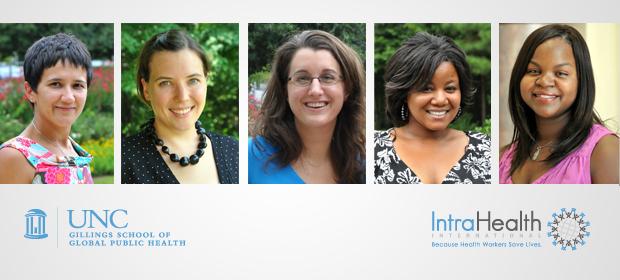Where We Work
See our interactive map


Founded this year, the IntraHealth-UNC Summer Fellows Program gives graduate students at the nation's leading public school of public health, the UNC Gillings School of Global Public Health, an opportunity to complete a required 10-week internship with IntraHealth, a local globally renowned international health NGO, providing practical, applicable experience with more continuity between students and staff, post-fellowship.
“This internship is the perfect example of what we would like to see more of; we can’t educate our students without organizations like IntraHealth,” explains Gretchen Van Vliet, director of the Office of Global Health in UNC’s school of public health. “While [students] are learning things in the classroom, they need to be able to apply, and to see, theories in action, here in an organization.”
Last week, during a poster exhibition and discussion with faculty and staff, the four masters’ students and one doctoral candidate— Laura Houenou, Kristen Brugh, Natalie Gill, Kate Krieger, and Zulfiya Chariyeva from the departments of Maternal and Child Health, Health Policy and Management, and Health Behavior and Health Education—together, shared their research and insights on IntraHealth programs at the culmination of their 10-week fellowship.
“There aren’t a lot of paid, structured opportunities out there for public health interns” says Laura Houenou, a fellow who supported IntraHealth’s USAID-funded project in Senegal this summer, “and even fewer for global health,” she adds. Fluent in French, Houenou created questionnaires as part of an overall evaluation plan for following up with French-speaking health workers, trained by IntraHealth medical staff in maternal health, family planning and malaria.
“When I started my masters', I had my heart set on an internship abroad,” Houenou says. “I became attracted to this program because it offered so much of the international experience I was looking for, but just miles from campus.”
The full-time, paid program allows students to gain direct experience in one of IntraHealth’s key program areas—-HIV/AIDS, family planning, maternal and child health, and health systems strengthening—-as well as cross-cutting technical areas and program development. This is supplemented by frequent interaction across all departments through seminars, workshops, brown bag presentations, working meetings and formal mentorship.
The other fellows echoed Houenou’s enthusiasm for the program created by IntraHealth and UNC, remarking that the cumulative experience is more integrated and stimulating than what they called “typical” internships.
“I really wanted to work at IntraHealth because it allowed for working with other people outside of my core department—which has been really fulfilling—and it seemed to have a strong structure,” says Kate Krieger, who worked for Planned Parenthood in the US prior to starting her master’s at UNC. She also wanted to gain international experience from her internship, specifically with maternal and child heath programs for vulnerable populations.
“In many of our projects throughout the world, we work to strengthen the basic training of health professionals,” says Rebecca Kohler, vice president for strategic development and communications at IntraHealth. She says that the program “brings this approach home, linking graduates students from the Triangle with practical, hands-on experience that links students to IntraHealth programs in the field.” Kohler discussed the Fellowship further in this interview with WCHL.
IntraHealth was a program of the UNC School of Medicine for 23 years, known as Intrah, until 2003, when it became an independent nonprofit.



